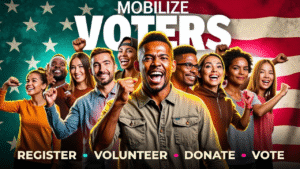How Political Candidates Can Actually Get Noticed on Social Media
Social media has become indispensable for political campaigns, offering unprecedented opportunities for candidates to reach voters directly, amplify their messages, and mobilize supporters. For political candidates, mastering social media strategies is no longer optional, it’s essential. This comprehensive guide explores effective ways political candidates can boost their visibility through strategic use of social media platforms.

Understanding the Power of Social Media in Politics
Social media platforms such as Facebook, Twitter (now X), Instagram, YouTube, LinkedIn, and TikTok serve as powerful tools to connect directly with voters. These platforms enable candidates to bypass traditional media gatekeepers and speak directly to the electorate. Moreover, social media is cost-effective, accessible, and highly interactive, making it ideal for grassroots and large-scale campaigns alike.
Establishing a Clear and Consistent Brand
A successful social media campaign begins with a clear and consistent personal brand. Political candidates must articulate their core values, political stance, and unique personality clearly. Consistency across platforms, in visual branding, tone, and messaging.. Reinforces recognition and trust among voters.
Create Engaging Content
To capture attention in a crowded digital landscape, candidates must produce engaging, relevant, and informative content. Here are content types that resonate:
- Videos: Short-form videos (TikToks, Reels, Stories) provide quick, impactful messages. Long-form content (YouTube, Facebook Lives) can elaborate on policy positions or host interactive Q&A sessions.
- Images and Infographics: Visually appealing images and infographics effectively communicate complex ideas quickly.
- Live Streams: Real-time broadcasts from rallies, town halls, or casual “behind-the-scenes” moments encourage voter engagement and transparency.

Leverage Influencers and Advocates
Candidates can amplify their message by collaborating with influential community leaders and social media personalities. Influencers and trusted advocates can extend your reach significantly, as their endorsement lends credibility and expands your audience.
Actively Engage with Your Audience
Social media is interactive, and successful candidates actively engage with their followers. Promptly respond to comments, encourage dialogue through questions, and acknowledge the community contributions. Active engagement fosters trust and demonstrates approachability.
Use Data and Analytics to Refine Strategies
Platforms like Facebook, Instagram, and Twitter offer robust analytics tools. Monitoring metrics such as engagement rates, video views, shares, and audience demographics allows candidates to understand what content performs best, thereby continually refining their strategies.
Paid Advertising and Targeting
Organic reach alone may not suffice in competitive campaigns. Paid advertising allows precise targeting of specific demographics based on location, interests, and behavior. Social media ads can boost visibility, drive voter registration, and increase attendance at campaign events.
Harnessing Platform-specific Strategies
Each social media platform offers unique strengths:
- Facebook: Ideal for community building, event promotion, and sharing detailed policy information.
- Instagram: Perfect for visual storytelling, showcasing personal and candid moments, and interactive Stories.
- Twitter/X: Essential for quick updates, rapid response to events, and engaging in political discourse.
- TikTok: Effective for reaching younger voters through trends, challenges, and short impactful messages.
- LinkedIn: Best for connecting with professionals, business leaders, and sharing detailed policy insights.

Case Studies: Successful Social Media Campaigns
Consider Barack Obama’s groundbreaking 2008 social media campaign, which mobilized grassroots support through digital engagement. Similarly, Alexandria Ocasio-Cortez harnessed social media brilliantly in her 2018 campaign, using Instagram Live to connect authentically with voters and build a powerful grassroots movement.
Mitigating Risks and Challenges
Social media offers vast opportunities but comes with inherent risks. Negative comments, misinformation, and public backlash can rapidly escalate. Candidates must have clear protocols for crisis management, responding professionally and promptly to challenges while maintaining authenticity.
Building Authenticity and Trust
Voters value authenticity. Candidates who share genuine stories, acknowledge mistakes, and show transparency tend to build stronger emotional connections with their audience. Authenticity fosters trust, which is crucial for voter loyalty and long-term support.
Mobilizing Voters to Action
Ultimately, social media visibility aims to mobilize voters into action.. registering, volunteering, donating, and voting. Candidates must frequently include clear calls to action, guiding supporters on how they can actively contribute to the campaign’s success.

Conclusion: Social Media as a Political Game-Changer
In today’s digital-first political landscape, social media is a powerful game-changer. Candidates who strategically leverage social media to communicate authentically, engage actively, and mobilize effectively will significantly enhance their visibility, credibility, and electoral success. By embracing these comprehensive strategies, political candidates can effectively navigate the complex world of social media and inspire voters towards meaningful action.
Enjoyed this post?
If you’re ready to level up your personal brand and make a lasting impact online, my team and I are here to help.

